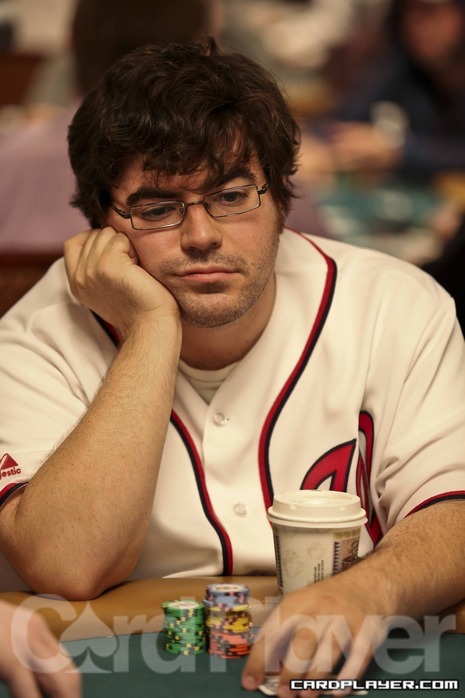






Ed Miller Discusses His New Poker Strategy BookPoker's 1 Percent: The One Big Secret That Keeps Elite Players On Top |
|
|
 Poker author and Card Player columnist Ed Miller has written eight books on the game, selling over 250,000 copies to aspiring poker players around the world.
Poker author and Card Player columnist Ed Miller has written eight books on the game, selling over 250,000 copies to aspiring poker players around the world.
It started with Small Stakes Hold’em: Winning Big With Expert Play and continued with No-Limit Hold’em: Theory and Practice. Since, Miller has added Playing The Player: Moving Beyond ABC Poker To Dominate Your Opponents and his latest book, Poker’s 1%: The One Big Secret That Keeps Elite Players On Top.
Poker players looking for an edge can pick up a PDF version of Miller’s book at his website. The book will also be available at Amazon in paperback and electronic versions later this month.
Julio Rodriguez: What made you decide to title your book Poker’s 1%? Who are the 1 percent? When did you decide to write the book and how long did it take?
Ed Miller: I talk to a lot of people about poker, some elite players and a lot of regular players too, and I noticed that there was a big difference in the way poker’s elite looks at the game versus everyone else. I decided to write a book designed to bridge that gap. So that’s how I got the title. The book is a window into what makes the top 1 percent of poker players so different from everyone else.
I got the idea for the book in October and started writing in November. It’s coming out in early March, so it took about four months to write.
JR: Do you continue to write because you have more to say, or simply because the game has changed so much over the last decade?
EM: This one is my eighth book. It’s crazy to think about that. I keep writing books because I keep learning about poker. So it’s both, because I have more to say and because the game has changed.
I feel like I act as a go-between. On one side there are the cutting edge poker thinkers who refine strategy concepts year in and year out. And on the other side there are the average poker players who like to play the game once, twice, three times a week, but who aren’t necessarily plugged into the newest strategy ideas. I try to take the cutting edge strategy ideas (as I learn and understand them) and explain them to regular folks in as simple and straightforward a way as I can.
JR: How did you determine the content for this book? Is your writing driven by your own experiences on the felt?
EM: All my writings are intended for the same sort of player, which is the serious amateur. I write for people who are smart, regular poker players who feel like they’ve hit a ceiling and can’t get to the next level. Primarily, these players play at the $1-$2 through $5-$10 levels live (and $1-$2 and below online), so that’s what I write about.
I actually got the idea for this book from some of my coaching sessions in September and October of last year. I had three students all at the same time, all serious professional players, who all had run into the same roadblock. They had learned to win in a certain type of game, but had begun to struggle when the game changed on them.
I taught them all the same ideas, which were ideas that elite players use to succeed in any poker game and showed them all the same work to do to improve. Then I figured that if three of my most serious students needed to know this, I should write a book about it.
JR: Your first chapter explains that players shouldn’t play no-limit hold’em like a slot machine. Do you feel that’s the biggest problem with today’s average low-stakes player? Are poker players simply trying too hard to make hands rather than win pots?
EM: Sure. It’s the first chapter because it lays the groundwork for the more complex ideas later in the book. But yeah, way too many poker players just focus on trying to make hands. As long as they keep that mindset, they’ll never really have long-term success.
And I wouldn’t say “make hands” versus “win pots” is quite the right framework. If you focus too much on winning pots you won’t do well either. The idea is to build a comprehensive strategy that will exploit your opponents’ vulnerabilities no matter where they leave them. If making hands is going to get the money, then your strategy will do that. If winning pots (i.e., bluffing) will get the money, then your strategy will do that. You want a solid, balanced approach.
JR: The book advocates a math-based approach to checking, betting, raising, calling and folding frequencies and you state “if your frequencies are more correct than the players you play with, you will win their money.” What is your opinion of feel-based players or those who rely on physical tells to help them make their decisions?
 EM: Feel is great. Tells are great. All other things equal, there’s no doubt you’ll win a good bit more money if you have good feel, or if you can make good reads. But I believe that feel and tells are best laid upon a solid foundational strategy. And that strategy is derived mathematically.
EM: Feel is great. Tells are great. All other things equal, there’s no doubt you’ll win a good bit more money if you have good feel, or if you can make good reads. But I believe that feel and tells are best laid upon a solid foundational strategy. And that strategy is derived mathematically.
Math tells you what the default play should be. Feel, reads, and tells tell you when you should deviate from the default. If you try to rely solely on feel, reads, and tells without first building the base strategy, you will make a lot of errors. The best players in the world today are experts at both math and feel.
JR: What is your opinion of the current poker landscape? Are the games getting worse or are they better than ever? Are you worried that your book and others like it are creating unprofitable games?
EM: Games today are highly profitable. There’s no doubt that each year over the last decade, the general level of play has risen. This is more true online than live, but it’s true in both arenas. The thing is, however, that the best players are also way, way better today than they were a decade ago. The relative edge the truly elite have over everyone else is still huge.
The problem for most people, and the reason that you hear people complain about the games being dead, is that the edge that regular amateurs and fledgling pros have over casual amateurs has closed. Casual players come to the game armed with an understanding of strategy that doesn’t lag too far behind many of the regulars. So the regulars have lower win rates and more perceived variance.
I’m not worried that my writings will create unprofitable games for a couple of reasons. First, top players will always be several steps ahead. If you want that edge over everyone else, as long as you’re willing to work for it, it will be there for you. And second, it really is work. If you want to become elite at poker, just like in any other field, you need to work, work, work. There are no shortcuts. As long as there are people out there who think poker is easy money, the games will remain good.
